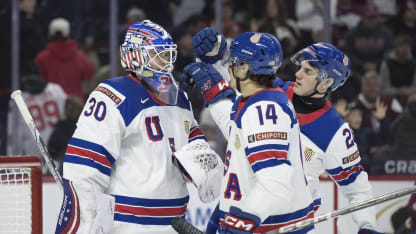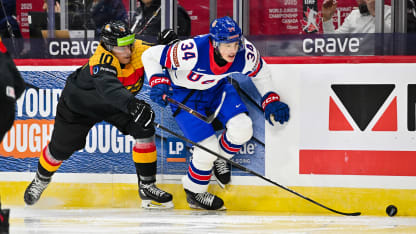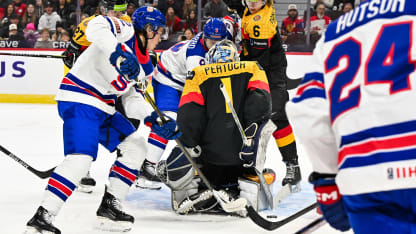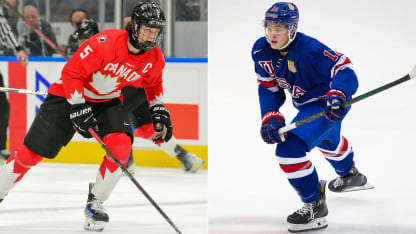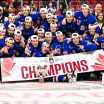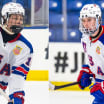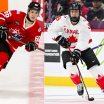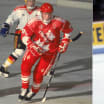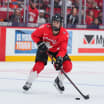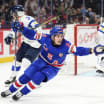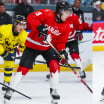The NHL Network will air every game of the 2025 IIHF World Junior Championship in Ottawa. It includes comprehensive coverage of the United States National Junior Team (2-0-1-0), which will play the fourth of four preliminary-round games in Group A against Canada at Canadian Tire Centre in Ottawa on Tuesday (8 p.m. ET). The playoff round begins Jan. 2.
NHL Network's E.J. Hradek will handle play-by-play with former NHL forward Tony Granato offering color commentary. Mike Kelly and Jon Morosi also will be part of the coverage, and longtime NCAA hockey analyst Dave Starman will provide in-studio analysis and will give his three keys to victory for the United States before each of its games during the 11-day tournament.
"I asked an NHL assistant general manager I'm friendly with to assess the U.S. performance after three games and 'underwhelming' was his response," Starman said. "Having watched several parts of it back in clips on Sportlogiq, here is my assessment of their upcoming game against Canada. Win this, the path to the semifinal round gets a lot easier. Lose and combined with a Finland win in regulation, the path gets a lot bumpier.
"That being said, winning the pool was always coming down to this game, it still is, and that plan is still unchanged. Having covered the University of Denver during David Carle's time as coach, I can tell you he is the master of prepping teams for what games really matter, which ones don't, and how to build for that one big win at the end."
Here are Starman's 3 keys to victory for the United States against Canada:
1. Power-play production
"Revert back to my first three things post. I referenced one of the things needed to succeed to win World Juniors or any short tourney is the power play. An old joke at the WJC is no team can kill a third period penalty; it just seems any power play in a third period as the tourney moves on is a goal. The United States power play looked shaky on its entries and while it had some good looks, especially the Zeev Buium up top to James Hagens on the right dot, it didn't score. Former Boston University coach Jack Parker, a coaching legend, once told me, "The power play is simple; can our five outwork their four?" Watching the clips back, against the Finns, the answer was no. Against the Canadians, it has to be 'yes'. They gave up a short-handed goal and almost gave up a second. The players need to be smarter."
2. Full 60-minute effort
"We all know that playing a full 60 minutes is a cliche; it just doesn't happen. The reality is, can you play a good 45 minutes and be good enough the remaining 15 minutes when your opponent is trying to play a full 60 to not lose the game? The U.S. looked real good early, then had many lapses in the game where the energy, intensity, attention to detail, wasn't there. I can't remember a World Juniors game when Finland took 44 shots (even against a bad team) ... it's just not their thing. Puck possession, some simplicity, and a lot of dog meat in their game has to be there for the U.S., and it hasn't been. As former NHL coach and my current studio analyst partner, John Torchetti, has told me many times, "The gritty sets up the pretty." Snarl, sandpaper, and discipline are a must against Canada. Believe me, they'll bring a lot of it."
3. Oh, Canada
"I was talking to Tony Granato, and I said to him, 'In all my years as an analyst doing U.S.-Canada games, the one thing I have noticed is that usually no matter what direction either team is going in, the other brings them back to their baseline game. It dials them back in.' That to me is the beauty of this rivalry. It's two North American teams playing a North American style game with a ton of familiarity between the players. It almost relaxes and refocuses the players into just playing their game. After two games against average teams (no disrespect intended), the U.S. got the Finns who had depth, were on point, and dialed in. Now that the U.S. has had its eyes blackened, I'd expect a game in which they are hard to play against, simple, and driving to the paint more. Canada has more to prove by winning this game, and that makes them dangerous. Not chasing the game is a big factor here. It conserves energy. Score first, score early, and take the crowd out of it. That's part of the equation here."
